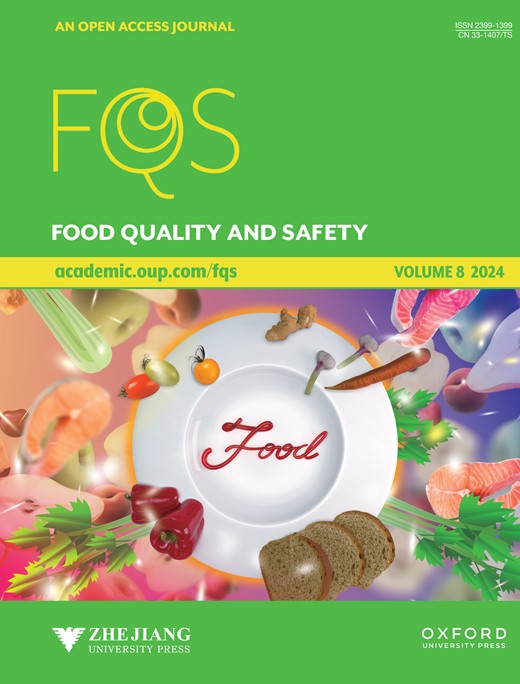Development of a competitive array for discriminative determination of amphenicols in egg based on ribosomal protein L16
IF 4.4
3区 农林科学
Q2 FOOD SCIENCE & TECHNOLOGY
引用次数: 0
Abstract
The amphenicols (chloramphenicol, thiamphenicol and florfenicol) can cause aplastic anaemia and other severe side effects to the consumers, so it is very necessary to inspect their residues in foods of animal origin. However, there has been no paper reporting the use of amphenicols receptor for the determination of their residues, and all the previously reported immunoassays for amphenicols can not differentiate the specific species. In this study, the ribosomal protein L16 of Escherichia coli was first expressed, and its intermolecular interaction mechanisms with the three amphenicols were studied by using molecular docking technique. Then the protein was combined with three enzyme labeled conjugates to develop a direct competitive array on microplate for determination of the three drugs in egg. Due to the use of principal component analysis to analyze the data, this method could discriminate the three drugs in the range of 0.1-10 ng/mL, and the limits of detection for the three drugs were in the range of 0.0002-0.0009 ng/mL. The analysis results for the unknown egg samples were consistent with a liquid chromatography tandem mass spectrometry method, and the method performances were superior to the previous immunoassays for amphenicols. This is the first paper reporting the use of ribosomal protein L16 to develop a competitive array for discriminative determination of amphenicols in food sample.开发基于核糖体蛋白 L16 的竞争性阵列,用于鉴别测定鸡蛋中的苯丙醇
苯霉素(氯霉素、噻吩霉素和氟苯尼考)可导致再生障碍性贫血,并对消费者产生其他严重的副作用,因此非常有必要检测动物源食品中的苯霉素残留量。然而,目前还没有论文报道使用安非尼类毒素受体来测定其残留量,而且之前报道的所有安非尼类毒素免疫测定法都无法区分特定的物种。 本研究首先表达了大肠杆菌的核糖体蛋白 L16,并利用分子对接技术研究了其与三种苯茚醇的分子间相互作用机制。然后将该蛋白与三种酶标记的共轭物结合,在微孔板上开发出直接竞争阵列,用于测定鸡蛋中的三种药物。 由于采用了主成分分析法对数据进行分析,该方法可以在0.1-10 ng/mL的范围内对三种药物进行鉴别,三种药物的检出限在0.0002-0.0009 ng/mL之间。对未知鸡蛋样品的分析结果与液相色谱串联质谱法一致,该方法的性能优于以往的安非尼酮免疫分析法。 这是第一篇报告利用核糖体蛋白 L16 开发竞争性阵列来鉴别测定食品样品中的茴香酚的论文。
本文章由计算机程序翻译,如有差异,请以英文原文为准。
求助全文
约1分钟内获得全文
求助全文
来源期刊

Food Quality and Safety
FOOD SCIENCE & TECHNOLOGY-
CiteScore
7.20
自引率
1.80%
发文量
31
审稿时长
5 weeks
期刊介绍:
Food quality and safety are the main targets of investigation in food production. Therefore, reliable paths to detect, identify, quantify, characterize and monitor quality and safety issues occurring in food are of great interest.
Food Quality and Safety is an open access, international, peer-reviewed journal providing a platform to highlight emerging and innovative science and technology in the agro-food field, publishing up-to-date research in the areas of food quality and safety, food nutrition and human health. It promotes food and health equity which will consequently promote public health and combat diseases.
The journal is an effective channel of communication between food scientists, nutritionists, public health professionals, food producers, food marketers, policy makers, governmental and non-governmental agencies, and others concerned with the food safety, nutrition and public health dimensions.
The journal accepts original research articles, review papers, technical reports, case studies, conference reports, and book reviews articles.
文献相关原料
公司名称
产品信息
索莱宝
Chloramphenicol (CAP)
阿拉丁
Thiamphenicol
 求助内容:
求助内容: 应助结果提醒方式:
应助结果提醒方式:


